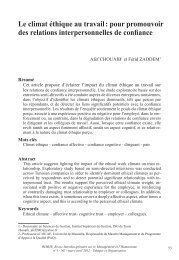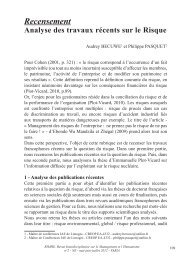Sana GUERFEL-HENDA, Manal EL ABBOUBI et Fatima - rimhe
Sana GUERFEL-HENDA, Manal EL ABBOUBI et Fatima - rimhe
Sana GUERFEL-HENDA, Manal EL ABBOUBI et Fatima - rimhe
You also want an ePaper? Increase the reach of your titles
YUMPU automatically turns print PDFs into web optimized ePapers that Google loves.
72<br />
La socialisation organisationnelle des nouvelles recrues<br />
<strong>Sana</strong> <strong>GUERF<strong>EL</strong></strong>-<strong>HENDA</strong>, <strong>Manal</strong> <strong>EL</strong> <strong>ABBOUBI</strong> <strong>et</strong> <strong>Fatima</strong> <strong>EL</strong> KANDOUSSI<br />
Références<br />
Ashforth B. E., Saks A. M., Lee R. T. (1998), Socialization and newcomer adjustment : The<br />
role of organizational context, Human Relations, vol. 51, n°7, p. 897-927.<br />
Anakwe U. P., Greenhaus J. H. (1999), Effective socialization of employees : Socialization<br />
content perspective, Journal of Managerial Issues, vol. 11, n°3, p. 315-329.<br />
Bardin L. (1980), L’analyse de contenu, Presses Universitaires de France, Paris.<br />
Bargues E. (2008), Gérer la socialisation organisationnelle pour développer/maintenir la<br />
culture de l’organisation : vers un enrichissement des connaissances des pratiques, Actes du<br />
XVIIIè Congrès International de l’AGRH, A quoi sert la GRH?, Dakar 9-12 novembre.<br />
Bargues E. (2012), L’influence de la configuration des PME sur leurs pratiques <strong>et</strong> leurs<br />
tactiques de socialisation, Actes XXIème conférence de l’AIMS.<br />
Bauer T.N., Green S.G. (1998), Testing the combined effects of newcomer information seeking<br />
and manager behavior on socialization, Journal of Applied Psychology, vol. 83, p. 72-83.<br />
Bem D. J., Allen A. (1974), On predicting some of the people some of the time : The search for<br />
cross-sectional consistencies in behavior, Psychological Review, vol. 81, p. 506- 520.<br />
Bertaux D. (1980), L’approche biographique. Sa validité méthodologique, ses potentialités,<br />
Cahiers internationaux de sociologie, vol.50, n°19, pp.197-225.<br />
Bogdan R., Bilken S. (1982), Qualitative research in education, Allyn and Bacon, Boston.<br />
Boussagu<strong>et</strong> S., Louart P., Mantione-Valero G. (2004), Mesure de la socialisation<br />
organisationnelle d’un repreneur de poste ou d’entreprise, Actes du 15ème Congrès de<br />
l’AGRH, Montréal.<br />
Boutin G. (1997), L’entr<strong>et</strong>ien de recherche qualitative, Presses de l’Université du Québec,<br />
Québec.<br />
Bowers K. (1973), Situationism in psychology : An analysis and critique, Psychological<br />
Review, vol. 80, p. 307-336.<br />
Cable M., Aiman-Smith L., Mulvey P. W., Edwards J. R., (2000), The sources and accuracy<br />
of job applicants’ beliefs about organizational culture, The Academy of Management Journal,<br />
vol. 43 n°6, p. 1076-1085.<br />
D’Andria A. (1995), La confirmation de recrutement - Pour une approche élargie du<br />
recrutement, Thèse de doctorat en Sciences de Gestion, Université de Lille I, IAE.<br />
Delobbe N., Vandenberghe C. (2000), Vers une modélisation des processus <strong>et</strong> facteurs<br />
d’adaptation à un nouveau contexte organisationnel : l’apport de la littérature sur la socialisation<br />
organisationnelle, Revue québécoise de psychologie, Vol. 21, n°3.<br />
Dey, I. (1993), Qualitative Data Analysis, Routledge, London.<br />
Eckert H. (2006), Une approche de l’intégration des jeunes dans l’entreprise, Notes Emploi<br />
Formation, Céreq, n°24.<br />
Fabre C. (2005), Décentralisation à la française, critique <strong>et</strong> contribution à la mesure de la<br />
socialisation organisationnelle en recherche de gestion, Toulouse : LIRHE - Unité mixte de<br />
recherche CNRS/UT1.<br />
Feldman D.C. (1976), A Contingency Theory of Socialization, Administrative Science<br />
Quarterly, vol. 21, p. 433-451.<br />
Feldman D.C. (1981), The Multiple Socialization of Organization Members, Academy of<br />
Management Review, vol. 6, n°2, p. 309-318.<br />
Jones G.R. (1986), Socialization tactics, self efficacy, and newcomers’ adjustments to<br />
organizations, Academy of Management Journal, vol.29, n°2, p. 262-279.<br />
Graen G.B. (1976), Role-making process with complex organizations. In M. Dunn<strong>et</strong>te (Ed.),<br />
Handbook of industrial and organizational psychology, Chicago : McNally, p. 1201-1245.<br />
Igalens J. <strong>et</strong> Roger A. (2007), Master en Ressources Humaines, Eska.<br />
Jokisaari M., Nurmi J. (2009), Change in newcomers’ supervisor support and socialization<br />
outcomes after organizational entry, The Academy of Management Journal, vol. 52, p.527-<br />
544.<br />
Lacaze D. (2002), Socialisation organisationnelle, pour intégrer <strong>et</strong> fidéliser, Entreprises <strong>et</strong><br />
Carrières, n°875.<br />
Lacaze D. (2005), Vers une meilleure compréhension des processus d’intégration : validation<br />
d’un modèle d’intégration proactive des nouveaux salariés, Revue Gestion des Ressources<br />
Humaines, Avril-Mai-Juin, p.19-35.<br />
Lacaze D. (2007), La gestion de l’intégration en entreprise de service : L’apport du concept de<br />
RIMHE, Revue Interdisciplinaire sur le Management <strong>et</strong> l’Humanisme<br />
n°4 - NE - novembre/décembre 2012 - Les Jeunes <strong>et</strong> le Travail


















